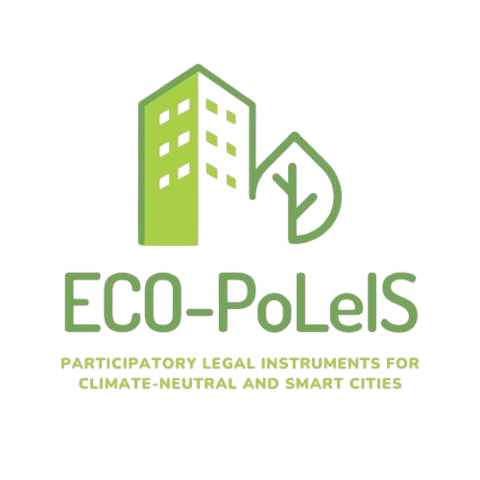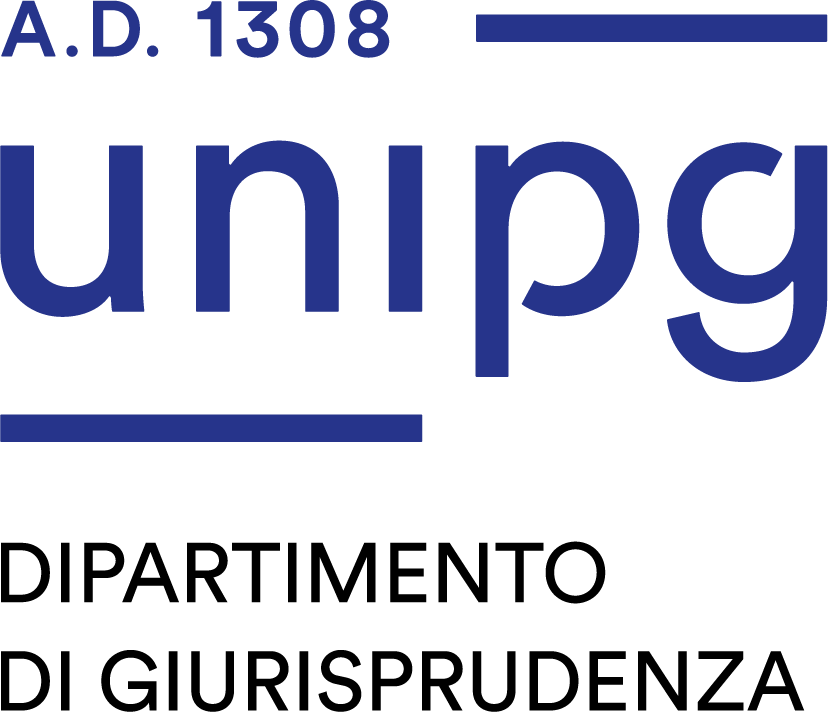
ECO-PoLeIS – Participatory Legal Instruments for Climate-Neutral and Smart Cities
Jean Monnet Module - Project: 101176263
ERASMUS-JMO-2024-HEI-TCH-RSCH
Coordinator: Jacopo Paffarini – Università degli Studi di Perugia
Duration: 36 months (1 January 2025- 31 December 2027)
Abstract: The Jean Monnet Module ECO-PoLeIS (“Participatory Legal Instruments for Climate-Neutral and Smart Cities”) seeks to integrate local climate governance and deliberative/participatory democracy. Through its teaching, research, and outreach activities, the module will address the legal complexities of urban environments, crucial for the EU’s strategic emission reduction targets. Anchored in the EU Mission: Climate-Neutral and Smart Cities, ECO-PoLeIS revolves around the role of urban initiatives, in Europe and worldwide, such as citizens’ assemblies on climate change, illustrating the critical role of local climate action.
In alignment with Erasmus+ priorities, ECO-PoLeIS aims to fill gaps in public awareness and academic research on participatory climate governance tools, empowering young people for sustainable policymaking. The module therefore promotes inclusive and digital education, echoing the Council Recommendation on learning for the green transition and sustainable development.
ECO-PoLeIS supports other key EU strategies, including the European Green Deal and the EU Biodiversity Strategy for 2030, in order to incorporate citizen inputs into environmental policymaking. The module employs innovative educational methods, such as simulated citizens’ assemblies (MCAs), to provide immersive learning experiences. ECO-PoLeIS aims to enhance sustainable democracy education, foster international research networks, and establish multi-sectoral partnerships across academia, local governments, and private actors. The module will conduct interdisciplinary research and consolidate community outreach, facilitating exchanges between European and local representative bodies.
By fostering a better understanding of climate democracy among students and relevant stakeholders, ECO-PoLeIS sets out to influence policy-making processes, contributing to the creation of more sustainable and inclusive urban environments in Europe and beyond.
People
Module holder:
Jacopo Paffarini, Comparative Public Law, University of Perugia
Project team:
Maria Chiara Locchi, Comparative Public Law, University of Perugia
Simone Vezzani, European Union Law, Univesity of Perugia
Enrico Buono, Comparative Public Law, University “Luigi Vanvitelli”
Teaching Activities
1st Year: “Urban Dimensions of Climate Democracy”
The provisional programme for the first-year course, focused on the methodological dimensions of climate democracy, is planned as follows:
- The concept of climate democracy in the context of EU’s environmental policies;
- The difference between participatory and deliberative democratic tools;
- Local climate and environmental policies in a multi-level perspective;
- The role of assemblies in local governments;
- Deliberative mini-publics.
Teaching activities will be articulated as follows:
- 40 hours within Comparative Public Law and Transnational Law (9 ECTS); European Union Law (9 ECTS); International and European Environmental and Food law (6 ECTS), available in both bachelor’s and master’s degree programmes at the Law Department and the Department of Agricultural, Food and Environmental Sciences;
- 20 hours as a specific course, open to students at all levels—from high school through bachelor’s and master’s programmes, up to doctoral studies—as well as to political stakeholders in local governments, and non-specialists.
2nd Year: “Deliberative and Participatory Instruments for Climate Change Mitigation”
The provisional programme for the second-year course, focused on a more detailed analysis of the toolbox of participatory and deliberative climate democracy, is planned as follows:
- Legal instruments for the Anthropocene, encompassing climate change litigation and climate change mitigation;
- Participatory democracy and additional representative bodies in local governments;
- The French model of débat public and the Aarhus Convention;
- Deliberative democracy and specific deliberative practices;
- Deliberative mini-publics in the Irish experience and in a European perspective.
Teaching activities will be articulated as follows:
- 40 hours within Comparative Public Law and Transnational Law (9 ECTS); European Union Law (9 ECTS); International and European Environmental and Food law (6 ECTS), available in both bachelor’s and master’s degree programmes at the Law Department and the Department of Agricultural, Food and Environmental Sciences;
- 20 hours as a specific course, open to students at all levels—from high school through bachelor’s and master’s programmes, up to doctoral studies—as well as to political stakeholders in local governments, and non-specialists.
3rd Year:“Public Policy Making and the Role of Citizens’ Assemblies in Climate Neutral and Smart Cities”
The provisional programme for the third-year course, focused on citizens’ assemblies on climate change, is planned as follows:
- Comparative perspectives on citizens’ assemblies on climate change: national-level assemblies;
- The pilot experience of the Irish 2016-2018 Citizens’ Assembly;
- The 2019 French Convention Citoyenne pour le Climat and the Loi Climat et Résilience;
- Citizens’ assemblies as drivers of constitutional reform: the case of the 2022 Citizens’ Assembly on Biodiversity Loss in Ireland;
- Local-level citizen assemblies: recent case studies from Italy (Bologna, Firenze, Milano).
Teaching activities will be articulated as follows:
- 40 hours within Comparative Public Law and Transnational Law (9 ECTS); European Union Law (9 ECTS); International and European Environmental and Food law (6 ECTS), available in both bachelor’s and master’s degree programmes at the Law Department and the Department of Agricultural, Food and Environmental Sciences;
- 20 hours as a specific course, open to students at all levels—from high school through bachelor’s and master’s programmes, up to doctoral studies—as well as to political stakeholders in local governments, and non-specialists;
- A final simulation of a citizens’ assembly (Model Citizens’ Assembly) will be organized at the conclusion of the course (additional 15 hours in the final year).
ACTIVITIES:
Ist Joint Academic Workshop "The role of active citizenship in the Green Transition"
17 October 2025, h.14:30
Room 7, Department of Law
Università degli Studi di Perugia - LEARN MORE>
Ciclo di Seminari
"La difesa dello Stato di Diritto tra Democrazia rappresentativa, autonomie e Citizens' Engagement"
24 October - 7, 14, 21 November 2025 - LEARN MORE>
Course Topic: “Urban Dimensions of Climate Democracy”
Duration: 40 hours of teaching within Comparative Public Law and Transnational Law (9 ECTS); European Union Law (9 ECTS); International and European Environmental and Food law (6 ECTS), available in both bachelor’s and master’s degree programmes at the Law Department and the Department of Agricultural, Food and Environmental Sciences.
Language: English/Italian
October/November 2025 - LEARN MORE>
Course Title: Building “Green Competencies”: the Dimensions of Climate Democracy
Duration: 20 hours
Language: Italian
October/November 2025 - LEARN MORE >
Il Workshop “Cittadinanza, democrazia e ambiente: quali modelli di partecipazione?“,
che si è svolto il 27 e 28 ottobre presso la Sala Lauree del Dipartimento di Giurisprudenza, è stato organizzato congiuntamente del Modulo Jean Monnet “ECO-PoLeIS” e dal progetto di ricerca “More4Water”, sostenuto dal programma europeo di finanziamento “Water4All”. La collaborazione tra i due teams di ricercatori e docenti nasce dalla comune esigenza di ripensare i diritti e la governance dei beni naturali, in particolare valorizzando il ruolo delle città. Il primo incontro delle due giornate ha avuto come oggetto il problema del sovraconsumo delle acque legato all’espansione delle nuove tecnologie, affrontato dalle relazioni di tre dottorande dell’Università brasiliana Univali. Nel giorno seguente, la mattinata è stata caratterizzata da una riflessione più generale sui possibili sviluppi della democrazia ambientale, a partire dalle esperienze del Sud del pianeta, con le relazioni di due docenti di Univali e due docenti dell’Istituto Superior “Dom Bosco” del Mozambico. Il pomeriggio del 28, infine, ha segnato “il ritorno dal globale al locale” con una Tavola rotonda a cui erano presenti i portavoce dei gruppi di acquisto di “Perugia Solidale” e “Fuori di Zucca”, della foodcoop “Birà”, la prof. Biancamaria Torquati del Dipartimento di Agraria, il Presidente della Confederazione Italiana Agricoltori dell’Umbria, Matteo Bartolini, e l’Assessore del Comune di Perugia, David Grohmann.
Nel complesso, l’evento è riuscito a far emergere in maniera limpida, grazie agli eccellenti contribuiti dei relatori, alcune delle implicazioni teoriche e operative che la crisi ambientale impone sul piano della partecipazione politica. È emersa, in particolare, la capacità della cittadinanza attiva di sfruttare gli strumenti forniti dalla normativa europea e dal diritto interno per creare soluzioni su base locale, che, tuttavia devono riuscire a costruire un giusto coordinamento. In chiusura dell’evento, il team di ECO-PoLeIS ha ribadito la volontà di garantire la continuità degli incontri tra università, istituzioni e gruppi organizzati per accompagnare e sostenere le politiche locali e i coordinamenti dell’economie solidali nella battaglia per la difesa dell’ambiente e per il raggiungimento della neutralità climatica.
Clicca sulle foto dell'evento per ingrandirle
 |
 |
 |
 |
 |
 |
“Funded by the European Union. Views and opinions expressed are however those of the author(s) only and do not necessarily reflect those of the European Union or EACEA-AJM.
Neither the European Union nor the granting authority can be held responsible for them.”



